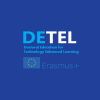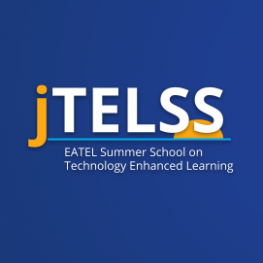Speakers
Alexander Neumann
RWTH Aachen University, GermanyRalf Klamma
RWTH Aachen University, GermanyStart
26/05/2022 - 17:30
End
26/05/2022 - 19:00
Modeling Chatbots for TEL
Thursday 26/05 15:30-19:00h
Main Hall
This session is organized by the DETEL Erasmus+ project. 
DETEL is a strategic partnership among nine European universities and EATEL to reflect their expertise in doctoral education into a new study program in TEL, extended with rich and professionally produced OERs.
Abstract
Current trends in technology-enhanced learning (TEL) show the increasing use of mobile devices for learning, for which social media are also more widely used. Scaling is essential for tremendous success in TEL. Recently, there was a strong focus on TEL, with an emphasis on personalization and better opportunities for collaboration and communication among students and educators. Chatbots are excellent human-computer interfaces for automating and scaling tasks, for example in human-resource management or customer relationship management. Their use in TEL it still limited, yet they can help out by automating simple tasks for teachers and learners. The limited use may be due to multiple reasons:
1) The technical hurdle of not having the expertise to create and maintain a bot.
2) The lack of familiarity with chatbots.
3) Concerns about the quality of the information provided by the chatbot.
In this workshop, we will work in groups to address these challenges and create awareness for chatbots and potential use cases. The use cases are coming from large-scale national research projects where chatbots have been utilized in a series of different scenarios. Real students have used the chatbots in real courses to this end.
Needs Analysis
The workshop’s primary purpose is to determine what types of bots should support teachers and learners in online learning spaces. From the PhD student’s point of view, this workshop is an opportunity to gather information about chatbots and become familiar with the topic. But, first, to present findings from current research and how chatbots have evolved within TEL over the past few years. On the other hand, we will address the questions “How can we minimize the technical barriers to developing and maintaining bots for non-technical users?” Chatbots are relevant for technology-enhanced learning/EdTech because they can help students with their learning process. For example, chatbots can help students with their homework, provide feedback on their work, and offer help when they are stuck. Additionally, chatbots can also help teachers track their students’ progress and identify areas where they may need assistance. Finally, this workshop will provide an opportunity for PhD students in TEL to learn about the benefits of developing new tools to support online learning by incorporating chatbots.
Learning Objectives
- They will learn about various concepts of chatbots and their current use in education.
- Through group work, they learn about possible scenarios where they can integrate chatbots in their design for mobile online learning
- New opportunities introduced by using model-driven platforms for creating a chatbot.
Pre-activities
Participants do not need to study any specific material before the workshop. However, maybe we provide literature to go more in-depth with the topic. We invite students to become a member of a Web-based modeling platform for chatbots and expose them to a series of online videos hosted on youtube. Before and after the session we will send chatbot based questionnaires to the students. Interests in online teaching, learning management platforms, open source software and modeling is expected, but no special technical knowledge is needed.
Session Description
Lecture style presentation about chatbots 10 min + 5 min (Q&A)
- Interactive presentation (including word clouds with participants’ expectations)
- What are (chat)bots?
- Challenges integrating bots in an educational context
Co-designing chatbots: 3-5 min task description; 25 min group work; 5-10 min presentation
- Groups of 3-4
- Select one use case (different options will be provided or one that was brainstormed during the previous presentation)
- Collaboratively work on different conversation paths that a learner/teacher (depending on the selected use case) would have with the chatbot.
- Annotate the responses of the chatbot and describe where the information is located
Lecture style presentation about the Social Bot Framework 10 min + 5 min (QnA)
Bot creation 20 min
- We pick one scenario of the results of the group work
- Model the bot together in the class (shared slack workspace or Rocket.Chat)
Post-activities
We will provide
- References to the topics discussed in this workshop.
- Contact information of the PhD students for future collaboration.
- Questionnaires.


